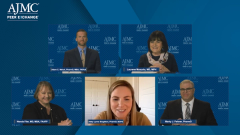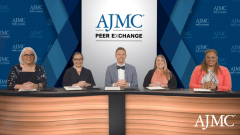
Complications Associated with RSV
Adam C. Welch, PharmD, MBA, FAPhA, leads a panel discussion surrounding complications related to RSV infection.
Episodes in this series

Adam C. Welch, PharmD, MBA, FAPhA: Dr Feltner, Dr Filer mentioned a bit about some of the symptoms of RSV [respiratory syncytial virus]. But if you’ve gotten infected with RSV, can you get infected again?
Marty J. Feltner, PharmD: Absolutely. Reinfection is very common not only with influenza, but with RSV and COVID-19. We are seeing it in our clinical practices, we’re seeing it in our long-term care and senior living communities. So testing is a priority for RSV to help prevent reinfection. You have to look at it from the health care model as well. In my clinical practice, we focus on the long-term care environments. If we have a resident in a neighborhood who has RSV, we can’t accept new residents potentially from a hospital that’s trying to discharge, if we have a hallway that has RSV or COVID-19 or influenza.
It’s a snowball effect, where we need to make sure we’re testing and we’re isolating those types of patients, that’s a priority. Also making sure we’re doing the appropriate measures for transmission risk, and that’s the key. We’ve learned a lot through COVID-19. We just have to apply those same types of techniques with RSV as well.
Adam C. Welch, PharmD, MBA, FAPhA: People tend to think this is a pediatric condition and that older adults don’t feel that ill if they come down with RSV, or they may not even know that they come down with RSV. What are some of the complications that are associated with having an RSV infection?
Wanda Filer, MD, MBA, FAAFP: We know about pediatrics, children can get bronchiolitis and get very sick. What I think people underestimate is the impact it has on adults, and especially the older adult, the adult who has chronic obstructive pulmonary disease, or COPD, and maybe an adult who’s had a bone-marrow transplant. The likelihood of them becoming very ill, requiring the ICU [intensive care unit], possibly requiring ventilatory support, being on a respirator, and even death, is extremely high.
The other part is, even if they survive—and fortunately, most, even those who were in the hospital and the ICU, will survive—they can see a deterioration in lung function that’s permanent. They will not recover that function. Patients with COPD can significantly worsen, even if they’re never in the hospital, if they get RSV as an outpatient and they’re sick for 2 weeks. That lung function that drops, we won’t get that back. So, I think it speaks to the power of prevention and the opportunity to keep these people from getting sick. Patients who are in the ICU, typically even for those who go home and recover, they’re still typically in the ICU longer than a patient with the flu. They’re often more likely to be on a ventilator. The costs associated with their care and the long-term costs of the sequelae of what they’ve been exposed to mount quickly.
Adam C. Welch, PharmD, MBA, FAPhA: We talked about people with chronic lung conditions, chronic heart conditions. What about age as a risk factor? When we say older adults, who are we talking about?
Wanda Filer, MD, MBA, FAAFP: Definitely 65 years old and up. And the older you get, the more susceptible you are to this. But even younger patients who have other comorbidities can have a problem. I mentioned bone marrow transplants, up to 25% of those people will end up with pneumonia and in the hospital.
Adam C. Welch, PharmD, MBA, FAPhA: How do we prevent the spread of RSV?
Marty J. Feltner, PharmD: It’s going to be the same techniques that we did with COVID-19. It’s very simple. If you’re sick, stay home from the workplace to stop the spread. Wash your hands for at least 20 seconds with soap and water. Don’t cough on another individual. We’re going to use the same techniques we are using with influenza and COVID-19 to stop the spread of RSV, and testing is a priority, in my opinion. This is underreported right now, we really don’t know what our transmission prevalence is in the community.
Laurene Mascola, MD, MPH: It’s also very difficult to test adults because they have a very low viral load. Some of the tests we use today, like EIAs [enzyme immunoassays] or whatever, sometimes miss adults because they do have a lower viral load. So, the diagnostics aren’t completely up to speed unless you do either a culture or PCR [polymerase chain reaction], which are usually very costly and usually demand something where you have to go to a hospital setting. Again, diagnostic tests don’t always help us.
Marty J. Feltner, PharmD: They’re expensive as well, and you’re going to be testing for COVID-19, influenza, and RSV. That can be a little pricey, and the insurance companies may not reimburse for those services in the providers’ offices.
Adam C. Welch, PharmD, MBA, FAPhA: We have adults who are exposed to RSV who may be asymptomatic but may still be carrying the virus, and infecting other people with the virus. And this virus can be on surfaces, and it can be transmitted in various ways. I want to bring in Dr Singleton now to talk a bit about the drivers of health care resources in patients with RSV. What resources are being utilized when someone comes down with RSV?
Abby Lynne Singleton, PharmD, BCPS: Definitely some of the drivers you guys have talked about recently are keeping patients healthy, preventing morbidity and mortality. As you talked about, there can be a lot of long-term complications when these patients get sick. Hopefully, we’re preventing those and preventing other illnesses they might have, and also trying to keep the patients out of the hospital and the ICU where they could get other infections and other things that could make them more sick.
Adam C. Welch, PharmD, MBA, FAPhA: A person with RSV infection, if they get hospitalized, that puts them at risk for other utilization of health care resources and the health care system, which we're trying to prevent hopefully with the vaccines that will be available soon.
Transcript edited for clarity.
Newsletter
Stay ahead of policy, cost, and value—subscribe to AJMC for expert insights at the intersection of clinical care and health economics.











